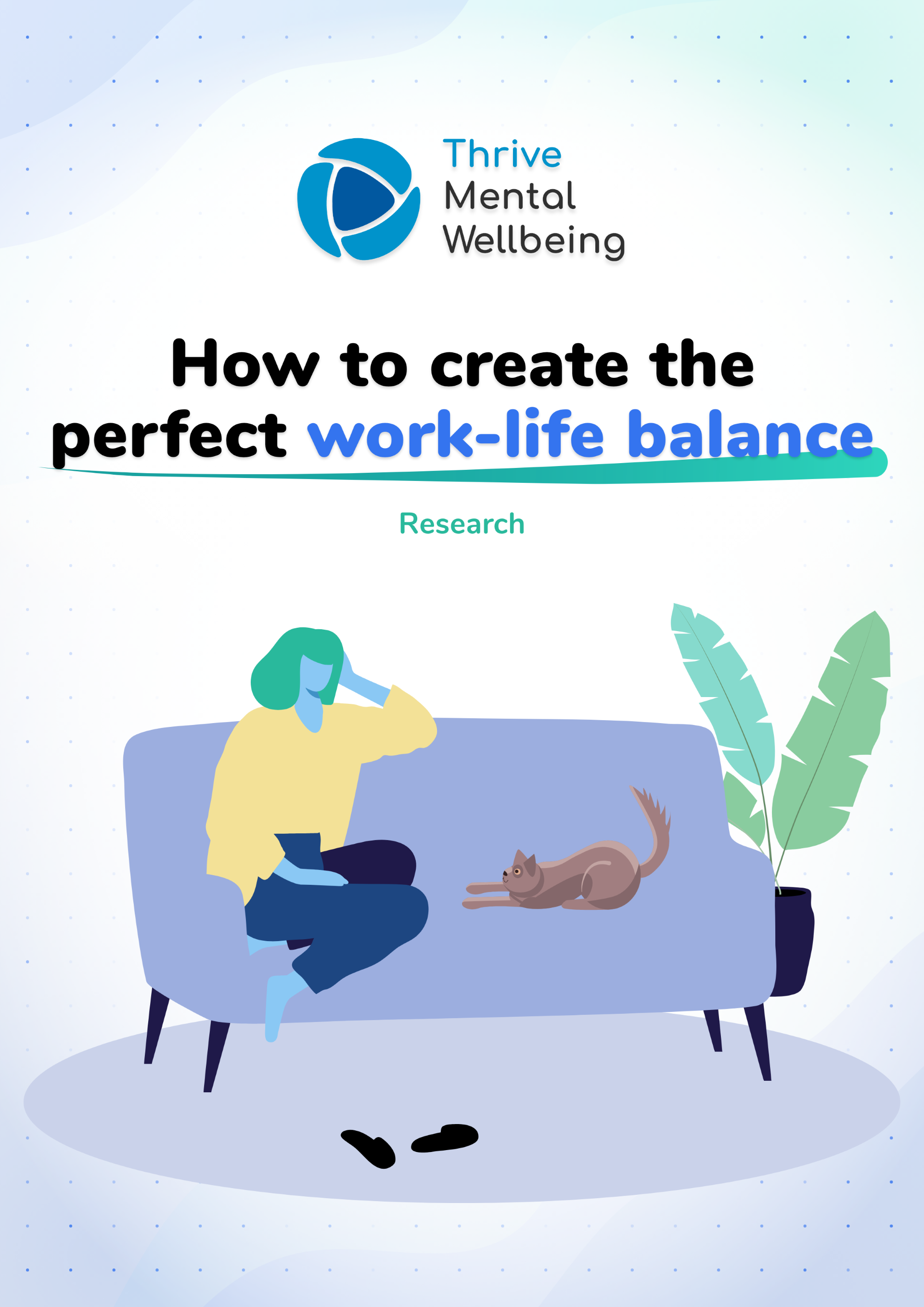
February 24, 2023
How to Create the Perfect Work-Life Balance
Navigating the challenges of modern life can be tough.
It can often seem like an ongoing struggle to keep on top of our work, family commitments, and hobbies and interests.
Yet one of the most important things to do for your mental wellbeing is to effectively manage your work-life balance.
There isn’t a one-size-fits-all approach for achieving the optimal work-life balance. It’s something that is unique to each person, and it often requires continuous work to improve it.
But it is possible for all of us to take control of how we split our time and effort between our personal and work lives - and it's never too late to start making positive changes.
In this article, we’ll take a look at some practical strategies and techniques to help you get there.
What is work-life balance and why it matters
Your work-life balance is best described as how well you manage your time and energy between work and other areas of your life, such as family, friends, hobbies, and personal growth.
Maintaining a healthy work-life balance is crucial for managing stress and looking after your overall well-being.
When you feel overwhelmed at work, and your to-do list doesn’t seem to be shrinking - it can be tempting to put in the extra hours to get on top of your workload.
But this can actually be counterproductive - taking a toll on your mental wellness and leading to a decrease in productivity.
By aiming for the right work-life balance, you give yourself the opportunity to pursue your passions, connect with people you care about, and recharge your batteries - allowing you to approach work with renewed energy and focus.
Unveiling the benefits of balancing work and life
When you’re able to achieve a healthy work-life balance, you can unlock a number of benefits, including improvements to your personal wellbeing, professional success and overall happiness.
When you have the time and energy to prioritise self-care, you’re more likely to take regular exercise, eat more healthily and get a full night’s sleep. In turn, this is likely to result in fewer health problems that impact you both personally and professionally.
In addition to the physical health benefits, maintaining a healthy work-life balance can significantly improve your mental wellbeing.
When you have the opportunity to pursue hobbies, spend quality time with loved ones, and engage in activities you enjoy - you’re more likely to experience reduced stress levels, increased happiness, and a greater sense of fulfilment.
Making sure you have the right work-life balance can also improve your performance at work - with employees that were able to strike the right balance in a 2021 study showing better communication, performance and productivity.
The modern workplace: understanding mental health and work-life balance
Managing your work-life balance in the modern workplace is easier said than done.
With the rise of remote work, and the constant connectivity blurring the boundaries between personal and professional life, finding the right balance can be more difficult than ever.
There are a lot of benefits to remote work - giving you additional flexibility and eliminating your daily commute. But it can also make it harder for you to disconnect from work.
The lack of physical separation between work and home can actually lead to longer working hours and increased stress levels.
Additionally, the rise of communications solutions like Microsoft Teams and work Whatsapp groups to streamline communication can result in expectation that immediate responses are needed to messages.
This pressure to respond immediately and to be seen as being productive can lead to feelings of job insecurity, and lead to a culture of overwork and feelings of being "always on" - resulting in burnout and a negative impact on your mental wellbeing.
Although it’s your responsibility as an individual to manage your own work-life balance, there are also measures that businesses can take.
Good examples are encouraging open communication about mental health, discouraging out-of-hours working, and providing access to resources such as employee mental health support apps.
Signs of an unhealthy work-life balance
Recognising the signs of an unhealthy work-life balance is the first step towards making positive changes.
Some of the signs to look out for include:
- Burnout: feelings of exhaustion, detachment from work and responsibilities, and decreased productivity.
- Chronic stress: feelings of irritability, difficulty concentrating, disturbed sleep, and a sense of being overwhelmed.
- Anxiety and depression: persistent feelings of worry and hopelessness.
More subtle signs to look out for are a noticeable reduction in job performance, strained relationships with teammates, or a lack of engagement with work.
It’s important to recognize the early warning signs of an unhealthy work-life balance, so you’re able to take proactive steps to address them before your symptoms become more serious.
Navigating the challenges
The modern work culture presents a number of challenges that can make achieving a healthy work-life balance difficult.
Long working hours, high-stress environments, and demanding workloads have become increasingly common, putting pressure on employees to prioritise work over personal life.
And as we discussed earlier, the rising popularity of remote work has blurred the boundaries between work and home, making it harder to disconnect and enjoy your personal time.
Additionally, the glorification of ‘busy culture' and the pressure to constantly be productive can lead to feelings of guilt for taking time off or pursuing non-work-related activities.
To help overcome these challenges, it's important to take personal responsibility to set clear boundaries about your working hours, and communicate these effectively with your employer and colleagues.
You might also consider having open conversations about your workload and expectations, suggest flexible work arrangements, and learn to say no constructively to protect your time.
Overcoming obstacles
In addition to taking proactive steps to navigate the challenges of the modern workplace, it’s also important to consider coping techniques should you ever start to recognise the early warning signs of becoming overwhelmed.
One effective approach for managing the signs of stress and anxiety is to practise relaxation techniques such as deep breathing and meditation, which can help calm your mind and reduce physical tension.
Taking regular exercise can also help manage stress and anxiety at work, and it’s also important to make sure you have a suitable support system, both at work and in your personal life - to help talk through how you’re feeling and address any problems.
If you find yourself feeling overworked, it is worth considering speaking to your employer about your workload or suggesting time management training to help you prioritise your workload during working hours.
And if you’re feeling the pressure to respond to work messages outside of your assigned working hours, a good starting point is to reassess your priorities and boundaries so you can achieve a reasonable work-life balance without feeling guilty.
If the above techniques don’t work - you might consider seeking professional help to overcome obstacles and develop a healthy work-life balance. This could include working with a therapist or counsellor to address underlying mental health concerns, learn coping strategies, and develop a plan for making positive changes.
Strategies for achieving work-life balance
Achieving a healthy work-life balance requires a proactive approach and a commitment to making necessary changes.
We’ve already covered some broad practical tips in this article, but let’s look at some immediately actionable techniques that you can implement quickly.
1. Separate home and office space in the house if working from home
If you work from home and have the space available, consider setting up a dedicated room as the place where you work. If this isn’t possible, make sure you’re working in a room other than your bedroom. This helps you to separate work and rest, and switch off at the end of the day.
2. Switch off alerts outside working hours
Consider implementing a ban for yourself on weekends and evenings to stop sending or checking emails. Your employer and colleagues should not expect a response outside of your contracted hours.
3. Write a daily exit list
Before you leave your desk at the end of the day, write down everything you need to do tomorrow.
There's a lot to be said for a pen and paper. Even if you have a digital task management tool, the act of writing things down can clear your mind and build a sense of control.
And if you feel like you are on top of things, it makes it easier to relax.
4. Have a shutdown ritual
It’s a good idea to have a daily shutdown ritual that signals to your brain that work is finished for the day.
This will be different for everyone, but could be as simple as packing your laptop away into your bag, but might also involve listening to music, talking to family, cooking a meal, taking a walk, or watering plants in your garden.
It’s important that your shutdown activity is enjoyable, disconnected from your job - and ideally, screen-free.
5. Make a quick note rather than opening your laptop
If you suddenly remember something after work and feel the urge to open your laptop and send an email, try to resist.
Instead, write your thoughts down on a notepad or record a voice note - just don’t reopen your laptop. This creates a sense of separation and perspective which is important for a work-life balance.
A lot of burnout and work-related stress comes from feeling like you’re behind on your to-do list.
So there are also techniques you’re able to implement that help you to become more productive during working hours and manage your work-life balance.
1. Stick to a routine
Have some ground rules, routines, or working schedule even when you are working from home.
Routines maintain a sense of control and make it easier to schedule other activities that enable us to switch off.
Routines might include getting up and going to bed at the same time every day, eating breakfast at a certain time, or playing sports on specific days.
It could also be planning time for relaxation or only scheduling meetings in the morning to allow focus time in the afternoon.
2. Use your “Out of Office”
Interruptions are the best way to ruin your productivity.
Emails or quick chats can fill your day with mini-meetings and tasks. The time in between this is usually not enough to complete anything meaningful.
It is important to keep in mind that most things don’t require immediate attention and can wait a few hours.
You will work much more efficiently if you schedule some uninterrupted time during the hours when you are most productive and address smaller tasks at a different time.
You could use the “Out of Office” alert or block out time in your calendar to prevent people from squeezing in calls.
3. Have regular breaks
It's a common trap to think about reducing your lunch break so you’re able to get more work completed.
While this might sound like a good idea in theory, the reality is, our body needs a rest.
It’s often better to have several short breaks during the day to improve your productivity.
In addition to a lunch break, try to have a number of short 10-15-minute breaks throughout the day. Doing light physical exercise like a quick walk can make breaks even more efficient.
4. Reward yourself for your successes
Changing or introducing new things into your life to try and achieve a better work-life balance might not always be an easy journey, but it’s a worthwhile one.
Every tiny new habit you stick to is getting you closer to a better, more fulfilling, balanced life. Take time to celebrate your wins and reward yourself!
Individual responsibility
We’ll come to the role that employers play in helping you achieve work-life balance shortly.
But, ultimately, the responsibility for achieving balance lies with you.
By taking ownership of your wellbeing and making proactive choices, you can create a more balanced and healthy life.
This includes prioritising self-care activities such as regular exercise, healthy eating, and making sure you get sufficient sleep.
Investing time in hobbies and personal interests is also important. Spending time doing activities that you enjoy outside of work helps you maintain a sense of identity and purpose, reducing your risk of burnout.
Finally, by surrounding yourself with a support network and seeking help when needed, you’ll find yourself better placed to navigate the challenges of balancing work and personal life.
The role of employers in cultivating work-life balance
While it’s up to you to take the primary responsibility for managing your work-life balance, your employer also plays an important role in creating an environment that supports and encourages a healthy environment and culture.
One key way employers can promote work-life balance is by offering flexible work arrangements, such as remote work options.
By allowing you to work from home or adjust your working hours around your personal commitments, your employer demonstrates their commitment to your well-being.
Flexible working can reduce stress, improve job satisfaction, and boost productivity by giving you more control over your time and working conditions.
Workplace wellness programmes are another valuable tool for promoting work-life balance, and can include a range of approaches, such as stress management workshops, physical fitness classes, and mental health seminars.
Creating a supportive and inclusive workplace culture is also essential for promoting work-life balance.
When employees feel valued, respected, and supported by their colleagues and managers, they are more likely to feel satisfied with their jobs and more likely to seek support and guidance if they are struggling with their mental health.
Thrive offers a comprehensive range of employee mental health support solutions, including a mobile app, online therapy sessions, and expert-led workshops, which can help organisations support their employees' mental and emotional well-being.
Success stories: work-life balance in action
To better understand how companies can successfully promote work-life balance, let's take a look at some examples from organisations that have made employee well-being a top priority.
One of the best examples is Unilever, a global consumer goods brand who are well known for their impressive employee satisfaction rates. The company's commitment to work-life balance is best illustrated through its generous parental leave policies.
New parents at Unilever enjoy 40 weeks of maternity leave and 90 days of paid adoptive leave, along with emergency childcare support and subsidised childcare facilities. These policies have helped Unilever attract and retain top talent while creating a positive work environment.
Another good example is advertising agency The7Stars, who have consistently been recognised as one of the best small companies to work for in the UK.
Employees at The7Stars benefit from fully paid gym memberships, weekly yoga and mindfulness sessions, and a truly flexible approach to working hours and paid leave. The company also offers unlimited holiday allowance and no contractually assigned working hours, giving employees the freedom to balance their work and personal lives in a way that suits them best.
Measuring and evaluating work-life balance
As you work towards achieving a better work-life balance, it's important to regularly measure and evaluate your progress and make adjustments as needed.
There are a number of simple yet effective ways to approach this.
One of the most valuable approaches is to keep a daily log of how you spend your time each day, including work, personal tasks, and leisure activities. This can help you identify areas where you may need to make changes.
There are many online quizzes and self-assessment tools that can provide insights into your current level of work-life balance and offer suggestions for improvement.
But perhaps the most important approach is to establish specific, measurable goals related to work-life balance, such as leaving work on time at least three days a week or dedicating a certain number of hours to a hobby.
It’s important to remember that your work-life balance strategies may need to evolve as your personal and professional circumstances change. If you experience a major life change or take on new responsibilities at work, you may need to reevaluate things and make adjustments to your plan.
Start a balanced life today with Thrive’s support
Throughout this article, we've explored the importance of work-life balance and the strategies you can use to achieve it.
It’s important to remember that your work-life balance is your own personal responsibility, and it’s up to you to make proactive choices towards a healthier life.
However, there are also ways that your employer can help - such as offering access to an employee's mental health support solution like Thrive.
At Thrive, we understand the challenges people face in managing a healthy work-life balance - which is why we provide the tools, resources, and support needed to create meaningful change.
Our range of services include a mobile app, online therapy and expert-led workshops, to help employees prioritise their mental and emotional well-being, manage stress, and build resilience.
If you think Thrive might be helpful for your business, get in touch with our team today.
Topics mentioned in this blog post:
Get the latest news with
Thrive Unplugged!
Sign up to our monthly newsletter to receive the latest news on everything Thrive Mental Wellbeing.








